状语从句种类
- 格式:doc
- 大小:22.00 KB
- 文档页数:2
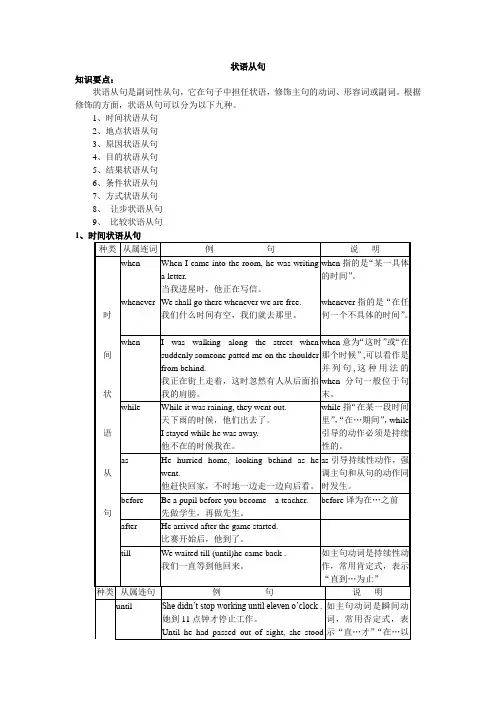
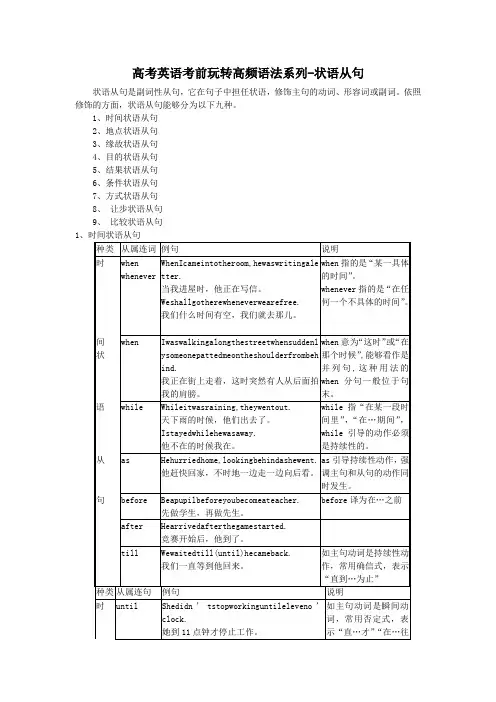
高考英语考前玩转高频语法系列-状语从句状语从句是副词性从句,它在句子中担任状语,修饰主句的动词、形容词或副词。
依照修饰的方面,状语从句能够分为以下九种。
1、时间状语从句2、地点状语从句3、缘故状语从句4、目的状语从句5、结果状语从句6、条件状语从句7、方式状语从句8、让步状语从句9、比较状语从句1、时间状语从句【专项训练】:Ⅰ、选择填空:1、YoulikesportsI’dliketoread.A、whenB、whileC、butD、yet2、weweresinging,theteachercamein.A、BeforeB、afterC、AsD、Until3、Iwasabouttoleavemyhousethephonerang.A、whileB、whenC、asD、after4、Theydidnotstopfightingtherewasnoenemyleft.A、untilB、afterC、whenD、since5、Ihavenotseenhimhewenttocollege.A、whenB、beforeC、asD、since6、Itisfivedayswecamehere.A、whenB、beforeC、asD、since7、Itwasnotlonghegottoknowit.A、whenB、beforeC、afterD、until8、Weshallgowearefree.A、wheneverB、whateverC、whereverD、however9、IliveImustservethepeopleheartandsoul.A、WhenB、SolongasC、AssoonasD、Oncondition10、IwasreadinganovelhewaswatchingTV.A、whenB、whileC、beforeD、as11、Putthemedicineyoucaneasilygetit.A、sothatB、whereC、whichD、there12、WewillgothePartywantsustogo.A、whereverB、thereC、totheplaceD、which13、thereisawillthereisaway.A、WhenB、WhereC、WhetherD、How14、Iamgoingyouwentlastweek.A、whereB、whereverC、whenD、theplace15、yougo,youshouldbearthemotherlandinyourmind.A、WhereB、WhereverC、WhateverD、However16、weatherpermits,we’llhaveanouting.A、ForB、ThoughC、WhileD、If17、Youwon’tsucceedharder.A、unlessyouwillworkB、unlessyouworkC、unlessyoudon’tworkD、ifyouwon’twork18、Iwonderifheus,andIthinkifheuswe’llbeabletocompletethetaskaheadoftime.A、helps,helpsB、willhelp,helpsC、helps,willhelpD、willhelp,willhelp19、Idon’tliketobeinterruptedifI.A、speakB、willspeakC、amspeakingD、spoke20、Ifyouthisexperimentyouwillunderstandthetheorybetter.A、willbedoingB、havedoneC、willhavedoneD、woulddo21、IwouldliketodoitIlikeit.A、sinceB、becauseC、becauseofD、nowthat22、everybodyishere,Let’ssetoff.A、SinceB、BecauseC、ForD、After23、Itwashewasillthathewasabsentyesterday.A、becauseB、asC、sinceD、nowthat24、itisraining,wehadbettertakeataxi.A、ForB、AsC、BecauseofD、When25、“Whycan’tyoudoitnow?”“I’mtoobusy.”A、SinceB、AsC、BecauseD、For26、Hemusthavepassedthisway,herearehisfootprints.A、sinceB、becauseofC、nowthatD、for27、everybodyishere,Let’sbeginourmeeting.A、NowthatB、BecauseC、ForD、When28、Hisspeechmadedeepimpressionontheaudiencethattheycouldhardlyforgetit.A、suchaB、soaC、soD、such29、Theyworkedhardtheyfinishedtheirworkaheadoftime.A、soB、sothatC、suchthatD、soasto30、Hewasweakhecouldn’tstandup.A、such,thatB、so,thatC、very,thatD、so,asto31、Theforeignerspokehisinterpretercouldhardlycatchhiswords.A、suchfastthatB、sofastC、sofastthatD、sofastlythat32、Thebookisitgivesawrongideaofthefacts.A、sowritingthatB、suchwrittenthatC、suchwritingthatD、sowrittenthat33、Thehousecostwedidn’tbuyit.A、somuchmoneythatB、somanymoneythatC、suchmuchmoneythatD、suchmanymoneythat34、Itisallofuscandoit.A、soeasyexercisethatB、sucheasyanexerciseC、sucheasyexerciseD、soeasyanexercisethat35、Shehassheremembersallthenamesofthestudentsshehastaught.A、sogoodmemorythatB、suchagoodmemorythatC、suchgoodmemorythatD、goodmemory36、TheystoppedatTianjingtheymightvisittheTVtower.A、soB、becauseC、sothatD、inorder37、Weallgotupearlywemightstartatsix.A、inorderthatB、inordertoC、soD、soasto38、Letthedogloosesothatithavearun.A、shouldB、mustC、couldD、need39、clearlysothatyourteacheryoucorrectly.A、Write,canunderstandB、Havingwritten,canunderstandC、Towrite,couldunderstandD、Writing,willunderstand40、Hestartedearlysothathethereintime.A、couldgetB、gotC、hadgotD、wouldhavegot41、itwaslate,shewentonworking.A、ThoughB、BecauseC、SinceD、Whether42、wefail,wetrying.A、Evenif,don’tstopB、Eventhough,won’tstopC、Even,willnotstopD、Evenalthough,shallneverstop43、thepainwasbad,hedidnotcomplain.A、Although,butB、Though,butC、Though,yetD、Even,still44、physics,helikesmathsbetter.A、AshemuchlikesB、MuchashelikesC、MuchlikesasheD、Likesmuchashe45、telephones,tellhimI’mout.A、NomatterwhoeverB、WhoC、WhoeverD、Anyone46、We’llcarrythereformtotheendhappens.A、nomatterhowB、whateverC、anythingD、nomatterwhich47、Ittakestimetogotherebyplanethanbyship.A、farfewerB、farlessC、muchfewerD、moreless48、Heistallerthaninhisclass.A、othersB、allthestudentsC、anyotheroneD、theother49、itwasfinishedintime.A、AstheworkwasdifficultB、DifficultastheworkwasC、DifficultaswastheworkD、Aswastheworkdifficult50、IamsorryIhavecausedsomuchtrouble.A、thatB、forC、asD、since51、hecame,hewouldbringusalotofflowers.A、EverytimesB、onetimeC、EverytimeD、Onceatime52、I’lltellhimaboutitIseehim.A、assoonasB、sosoonasC、whileD、as53、IhadhardlysatdownthetelephonerangA、thanB、whenC、asD、after54、Sityoulike.A、whereB、attheplaceC、asD、wherever55、hewasn’treadyintime,wewentwithouthim.A、SinceB、AsC、ForD、Becauseof56、Allplantsneedairtheyneedwater.A、likeB、asifC、asD、so57、Workhardyoucansucceed.A、inordertoB、sothatC、forfearthatD、incase58、IfyouIwillgowithyou.A、gotoB、wentC、willD、shouldgo59、Thehardheworks,hewillmake.A、thegreaterB、thegreaterprogressC、andthemoreD、more60、wehavethoughtitover,we’lltakesteps.A、Till,notB、When,noC、Until,anyD、Until,noⅡ、改错1、Itwon’tmatterevenherefuses.2、Jimimaginedthatthewholeworldknewofhisachievements,wheninfactonlyafewpeoplehadheardofit.3、Herealizedthathishousemusthavebeenbrokenintotheminutehegothomeandsawthateverythingwasinamess.4、Hewaslookingforthedictionarywheneverhethoughthemighthaveputit.5、Nomatterifheisfree,hemustgotothelibrary.6、IhavenotmissedaplayoraconcertwhenIwasseventeenyearsold.7、NexttimethatIplantotravelinLondon,I’mgoingtotakeaplane.8、I’mnotgoingtotalkonthepointanyfurther,thoughitisneitherimportantnorveryinteresting.9、MuchsinceIlikeallthebooks,Ican’taffordtobuythem.10、Alicwaswaitingforthebusthenshenoticedathiefrunningoutofashop.11、Ithasbeentwoandahalfmonthsagosinceheleft.12、Thoughtheworkwasdifficult,butwemanagedtofinishitintime.13、ThetestshowsthatJackhasamuchquickermindthananystudentinhisclass.14、HeleftforGuangzhoubytrainlastMonday.Heoughttohavearrived,Ithink..15、Theywrotetothebossinordertheycouldimprovetheirworkingconditions.16、Hegoesfishingwhereverhehastime,whichisnotoften.17、Idon’tknowwhenhecomestomorrow.Ifhecomes,letmeknowatonce.18、Whenyoureadabook,you’dbettermakeamarkthatyouhaveanyquestions.19、Shipsaremuchmoreslowerthanplanesthatfewpeopletakethemonbusiness.20、Shehassuchlittleeducationthatsheisunfitforthejob.【答案】:Ⅰ、1、 B 2、C 3、B 4、A 5、D 6、D7、B 8、A 9、B 10、B 11、B 12、A13、B 14、A 15、B 16、D 17、B 18、B19、C 20、B 21、B 22、A 23、A 24、B 25、C26、D 27、A 28、A 29、B 30、B 31、C 32、D33、A 34、D 35、B 36、C 37、A 38、C 39、A40、A 41、A 42、B 43、C 44、B 45、C 46、B47、B 48、C 49、B 50、A 51、C 52、A 53、B54、D 55、B 56、C 57、B 58、C 59、B 60、D Ⅱ、1、even后加if2、when—while3、minute—moment4、whenever—wherever5、if—whether6、when—since7、that去掉或改为when 8、though—because 9、since—as10、then—when 11、ago去掉12、but去掉13、any后加other 14、 15、order后加that16、wherever—whenever17、第一个comes—willcome〔宾从时态不限〕18、that—where19、more去掉20、such—so。
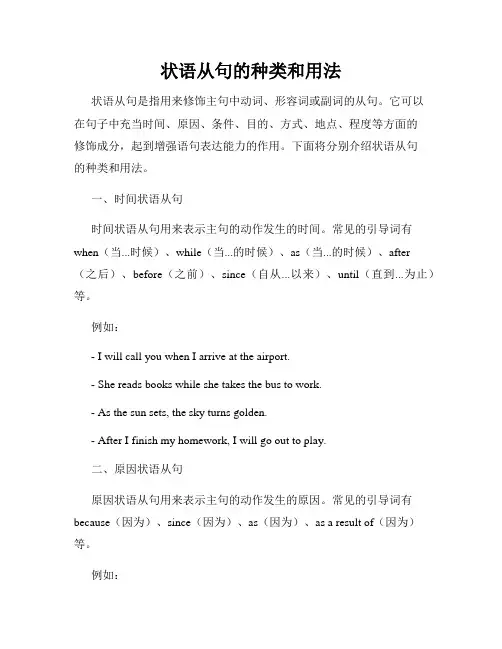
状语从句的种类和用法状语从句是指用来修饰主句中动词、形容词或副词的从句。
它可以在句子中充当时间、原因、条件、目的、方式、地点、程度等方面的修饰成分,起到增强语句表达能力的作用。
下面将分别介绍状语从句的种类和用法。
一、时间状语从句时间状语从句用来表示主句的动作发生的时间。
常见的引导词有when(当...时候)、while(当...的时候)、as(当...的时候)、after(之后)、before(之前)、since(自从...以来)、until(直到...为止)等。
例如:- I will call you when I arrive at the airport.- She reads books while she takes the bus to work.- As the sun sets, the sky turns golden.- After I finish my homework, I will go out to play.二、原因状语从句原因状语从句用来表示主句的动作发生的原因。
常见的引导词有because(因为)、since(因为)、as(因为)、as a result of(因为)等。
例如:- I cannot go to the party because I have to work.- Since it is raining, we will stay indoors.- He failed the exam, as he didn't study enough.- She was late as a result of heavy traffic.三、条件状语从句条件状语从句用来表示主句的动作发生的条件。
常见的引导词有if (如果)、unless(除非)、provided that(只要)、as long as(只要)等。
例如:- If it rains tomorrow, we will cancel the picnic.- Unless you apologize, I will not forgive you.- You can go to the party provided that you finish your homework.- I will lend you my car as long as you promise to drive safely.四、目的状语从句目的状语从句用来表示主句的动作的目的或意图。
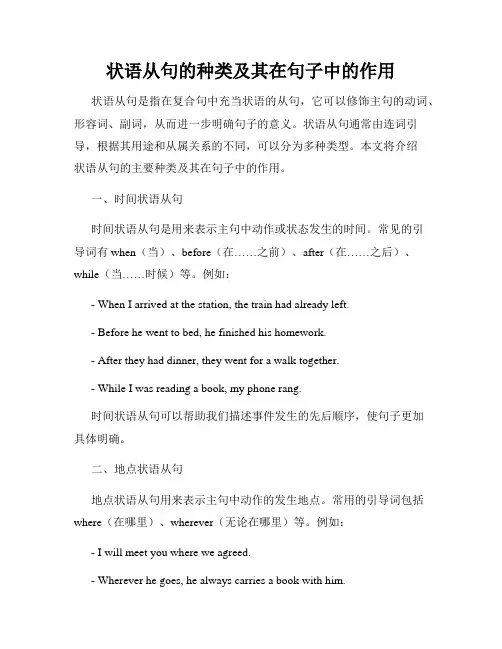
状语从句的种类及其在句子中的作用状语从句是指在复合句中充当状语的从句,它可以修饰主句的动词、形容词、副词,从而进一步明确句子的意义。
状语从句通常由连词引导,根据其用途和从属关系的不同,可以分为多种类型。
本文将介绍状语从句的主要种类及其在句子中的作用。
一、时间状语从句时间状语从句是用来表示主句中动作或状态发生的时间。
常见的引导词有when(当)、before(在……之前)、after(在……之后)、while(当……时候)等。
例如:- When I arrived at the station, the train had already left.- Before he went to bed, he finished his homework.- After they had dinner, they went for a walk together.- While I was reading a book, my phone rang.时间状语从句可以帮助我们描述事件发生的先后顺序,使句子更加具体明确。
二、地点状语从句地点状语从句用来表示主句中动作的发生地点。
常用的引导词包括where(在哪里)、wherever(无论在哪里)等。
例如:- I will meet you where we agreed.- Wherever he goes, he always carries a book with him.地点状语从句可以提供更多的信息,使句子更加具体生动。
三、条件状语从句条件状语从句用来表示主句中动作发生的条件。
常见的引导词有if (如果)、unless(除非)、provided that(只要)等。
例如:- If it rains tomorrow, we will stay at home.- Unless you study hard, you won't pass the exam.- Provided that you finish your work on time, you can go out and play.条件状语从句可以表达假设、推理和条件之间的关系,使句子更加有逻辑性。
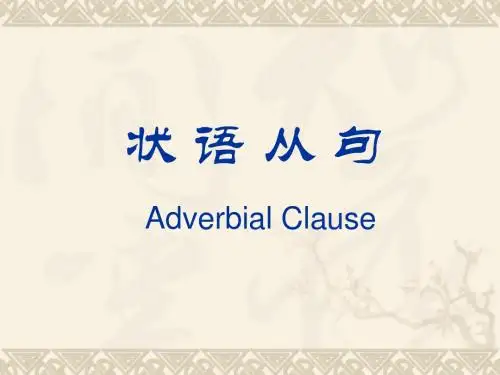
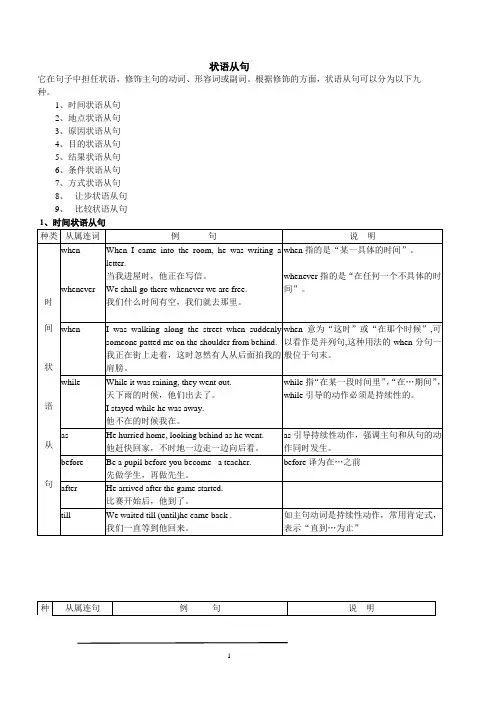
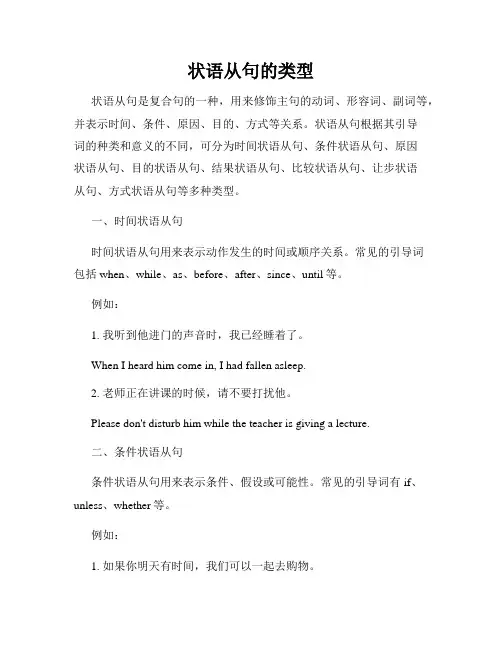
状语从句的类型状语从句是复合句的一种,用来修饰主句的动词、形容词、副词等,并表示时间、条件、原因、目的、方式等关系。
状语从句根据其引导词的种类和意义的不同,可分为时间状语从句、条件状语从句、原因状语从句、目的状语从句、结果状语从句、比较状语从句、让步状语从句、方式状语从句等多种类型。
一、时间状语从句时间状语从句用来表示动作发生的时间或顺序关系。
常见的引导词包括when、while、as、before、after、since、until等。
例如:1. 我听到他进门的声音时,我已经睡着了。
When I heard him come in, I had fallen asleep.2. 老师正在讲课的时候,请不要打扰他。
Please don't disturb him while the teacher is giving a lecture.二、条件状语从句条件状语从句用来表示条件、假设或可能性。
常见的引导词有if、unless、whether等。
例如:1. 如果你明天有时间,我们可以一起去购物。
If you have time tomorrow, we can go shopping together.2. 除非你帮助我,否则我无法完成这个任务。
I can't complete this task unless you help me.三、原因状语从句原因状语从句用来表示某个动作或情况发生的原因。
常见的引导词有because、since、as等。
例如:1. 由于天气不好,我们决定取消郊游计划。
We decided to cancel the outing because of the bad weather.2. 他没来参加聚会,因为他生病了。
He didn't come to the party because he was sick.四、目的状语从句目的状语从句用来表达主句中的动作或目的。
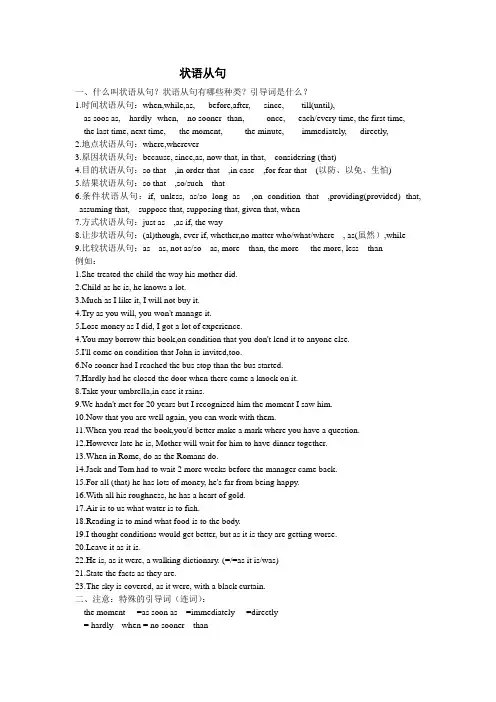
状语从句一、什么叫状语从句?状语从句有哪些种类?引导词是什么?1.时间状语从句:when,while,as, before,after, since, till(until),as soos as, hardly--when, no sooner--than, once, each/every time, the first time,the last time, next time, the moment, the minute, immediately, directly,2.地点状语从句:where,wherever3.原因状语从句:because, since,as, now that, in that, considering (that)4.目的状语从句:so that---,in order that---,in case---,for fear that---(以防、以免、生怕)5.结果状语从句:so that---,so/such---that---6.条件状语从句:if, unless, as/so long as----,on condition that---,providing(provided) that, assuming that, suppose that, supposing that, given that, when7.方式状语从句:just as---,as if, the way---8.让步状语从句:(al)though, ever if, whether,no matter who/what/where---, as(虽然),while9.比较状语从句:as---as, not as/so---as, more---than, the more----the more, less---than例如:1.She treated the child the way his mother did.2.Child as he is, he knows a lot.3.Much as I like it, I will not buy it.4.Try as you will, you won't manage it.5.Lose money as I did, I got a lot of experience.4.You may borrow this book,on condition that you don't lend it to anyone else.5.I'll come on condition that John is invited,too.6.No sooner had I reached the bus stop than the bus started.7.Hardly had he closed the door when there came a knock on it.8.Take your umbrella,in case it rains.9.We hadn't met for 20 years but I recognized him the moment I saw him.10.Now that you are well again, you can work with them.11.When you read the book,you'd better make a mark where you have a question.12.However late he is, Mother will wait for him to have dinner together.13.When in Rome, do as the Romans do.14.Jack and Tom had to wait 2 more weeks before the manager came back.15.For all (that) he has lots of money, he's far from being happy.16.With all his roughness, he has a heart of gold.17.Air is to us what water is to fish.18.Reading is to mind what food is to the body.19.I thought conditions would get better, but as it is they are getting worse.20.Leave it as it is.22.He is, as it were, a walking dictionary. (=/=as it is/was)21.State the facts as they are.23.The sky is covered, as it were, with a black curtain.二、注意:特殊的引导词(连词):the moment----=as soon as---=immediately----=directly---= hardly---when = no sooner---thanas/so long as---,on condition that---,in case---,now that---,provided that---=supposing that---,every time---, the first time---,the last time---, next time---五、如何区别不同的从句:(1)据连词。
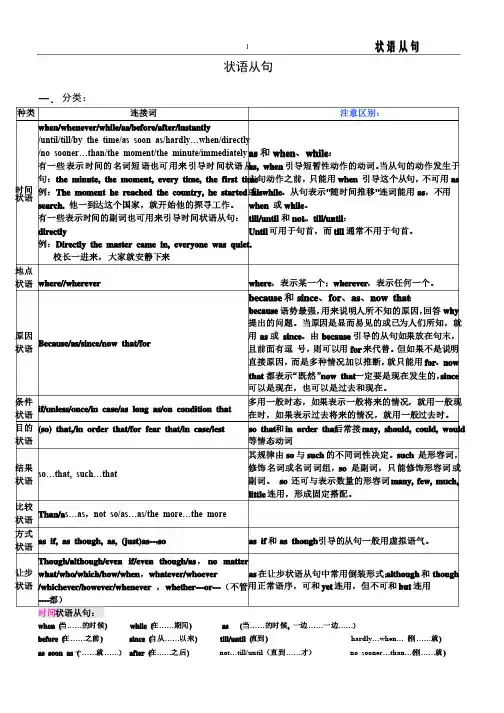
状语从句一.分类:种类连接词注意区别:时间状语when/whenever/while/as/before/after/instantly/until/till/by the time/as soon as/hardly…when/directly/no sooner…than/the moment/the minute/immediately有一些表示时间的名词短语也可用来引导时间状语从句:the minute, the moment, every time, the first time例:The moment he reached the country, he started hissearch. 他一到达这个国家,就开始他的探寻工作。
有一些表示时间的副词也可用来引导时间状语从句:directly例:Directly the master came in, everyone was quiet.校长一进来,大家就安静下来as和when、while:as, when 引导短暂性动作的动词。
当从句的动作发生于主句动作之前,只能用when 引导这个从句,不可用as或while。
从句表示"随时间推移"连词能用as,不用when 或while。
till/until和not…till/until:Until可用于句首,而till通常不用于句首。
地点状语where//wherever where,表示某一个;wherever,表示任何一个。
原因状语Because/as/since/now that/forbecause和since、for、as、now that:because语势最强,用来说明人所不知的原因,回答why提出的问题。
当原因是显而易见的或已为人们所知,就用as或since。
由because引导的从句如果放在句末,且前面有逗号,则可以用for来代替。
但如果不是说明直接原因,而是多种情况加以推断,就只能用for。
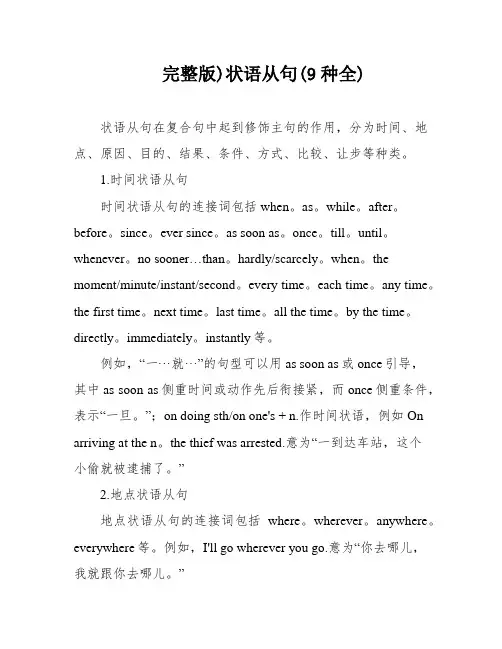
完整版)状语从句(9种全)状语从句在复合句中起到修饰主句的作用,分为时间、地点、原因、目的、结果、条件、方式、比较、让步等种类。
1.时间状语从句时间状语从句的连接词包括when。
as。
while。
after。
before。
since。
ever since。
as soon as。
once。
till。
until。
whenever。
no sooner…than。
hardly/scarcely。
when。
the moment/minute/instant/second。
every time。
each time。
any time。
the first time。
next time。
last time。
all the time。
by the time。
directly。
immediately。
instantly等。
例如,“一···就···”的句型可以用as soon as或once引导,其中as soon as侧重时间或动作先后衔接紧,而once侧重条件,表示“一旦。
”;on doing sth/on one's + n.作时间状语,例如On arriving at the n。
the thief was arrested.意为“一到达车站,这个小偷就被逮捕了。
”2.地点状语从句地点状语从句的连接词包括where。
wherever。
anywhere。
everywhere等。
例如,I'll go wherever you go.意为“你去哪儿,我就跟你去哪儿。
”3.原因状语从句原因状语从句的连接词包括because。
since。
as。
now that。
seeing that。
considering that等。
例如,Since it's raining。
we'll stay indoors.意为“因为下雨,我们将待在室内。
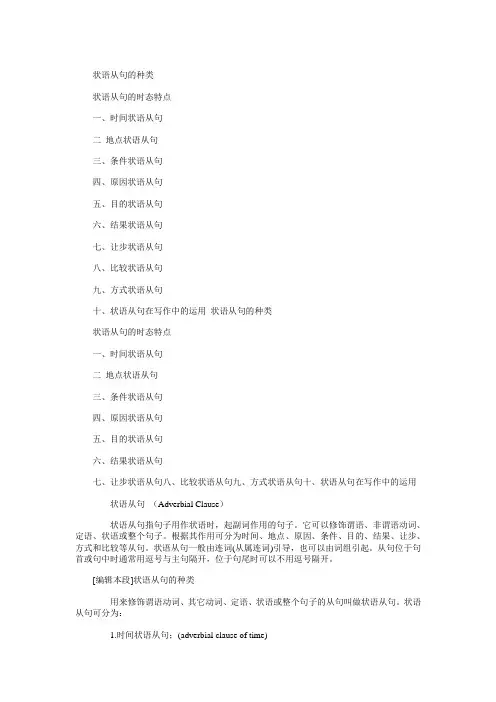
状语从句的种类状语从句的时态特点一、时间状语从句二地点状语从句三、条件状语从句四、原因状语从句五、目的状语从句六、结果状语从句七、让步状语从句八、比较状语从句九、方式状语从句十、状语从句在写作中的运用状语从句的种类状语从句的时态特点一、时间状语从句二地点状语从句三、条件状语从句四、原因状语从句五、目的状语从句六、结果状语从句七、让步状语从句八、比较状语从句九、方式状语从句十、状语从句在写作中的运用状语从句(Adverbial Clause)状语从句指句子用作状语时,起副词作用的句子。
它可以修饰谓语、非谓语动词、定语、状语或整个句子。
根据其作用可分为时间、地点、原因、条件、目的、结果、让步、方式和比较等从句。
状语从句一般由连词(从属连词)引导,也可以由词组引起。
从句位于句首或句中时通常用逗号与主句隔开,位于句尾时可以不用逗号隔开。
[编辑本段]状语从句的种类用来修饰谓语动词、其它动词、定语、状语或整个句子的从句叫做状语从句。
状语从句可分为:1.时间状语从句;(adverbial clause of time)2.地点状语从句;(adverbial clause of place)3.原因状语从句;(adverbial clause of cause)4.条件状语从句;(adverbial clause of condition)5.目的状语从句;(adverbial clause of purpose)6.让步状语从句;(adverbial clause of concession)7.比较状语从句;(adverbial clause of comparison)8.方式状语从句;(adverbial clause of manner)9.结果状语从句。
(adverbial clause of result)[编辑本段]状语从句的时态特点一般情况下,时间和条件状语从句的谓语动词一般用“一般现在时”表示“一般将来时”,用“现在完成时”表示“将来完成时”。
状语从句一.分类:when (当……的时候) while (在……期间) as (当……的时候,一边……一边……)before (在……之前) since (自从……以来) till/until (直到)hardly…when… (刚……就)as soon as (一……就……) a fter (在……之后) not…till/until(直到……才)no sooner…than…(刚……就)地点状语从句: where (在那里) wherever(无论哪里)原因状语从句:because (因为) since (因为,既然) as (由于) for (为了) now that(既然)目的状语从句: (so)that=in order that(以便) so as (not) to (以便[不]) in case(以免) lest(以免)结果状语从句:so+adj./adv.+that(如此……以致) so that(结果……)such+n。
+that(如果……以致) that(所以,因此)让步状语从句:though/although不可同but连用。
though/although (虽然) however (可是) even though(即使) even if (即使)no matter+what/which/where/who/when =whatever/whichever/wherever/whoever/whenever(不论什么/哪一个/哪里/谁/何时)比较状语从句:as (正如) as…as(和……一样)not as/so … as (不如……) than(比……更)the+比较级…+the+比较级(越……越……)条件状语从句:if(假设) unless(如果不) so long as(只要) on condition that (如果)方式状语从句:as(像……那样地) just as(正像) as if(好像) as though(好像)二.各种状语从句的简化方法:1.sth.作状语。
高中英语知识点归纳状语从句的种类与引导词归纳高中英语知识点归纳:状语从句的种类与引导词归纳状语从句是英语语法中一个重要的知识点,它能够用来修饰、限制或补充主句的行为、时间、原因、目的等方面。
在高中英语学习中,我们需要了解状语从句的种类以及常用的引导词,以便在写作和阅读中正确、灵活地运用它们。
本文将对状语从句的种类及其常用引导词进行归纳与总结。
一、状语从句的种类1. 时间状语从句:用来表示时间关系。
例如:- He will call me as soon as he arrives.- We can go out after it stops raining.- I will visit my grandparents when I have time.2. 地点状语从句:用来表示地点或位置关系。
例如:- I will meet you where we arranged.- They built a house where the river bends.- The children are playing in the park where we often come.3. 原因状语从句:用来表示原因或理由关系。
例如:- Since it is raining outside, we can't have a picnic.- As he is sick, he can't come to school.- I decided to go home early because I was tired.4. 条件状语从句:用来表示条件关系。
例如:- If it snows tomorrow, we can go skiing.- Unless you study hard, you won't pass the exam.- Provided that you finish your homework, you can watch TV.5. 结果状语从句:用来表示结果或后果关系。
初中英语知识归纳状语从句的引导词和种类引导状语从句的词语主要有:when,while,before,after,as soon as,until,unless,if,unless,since,because,although,though,wherever,whenever,however,no matter,in case,so that等。
状语从句可以分为时间状语从句、条件状语从句、目的状语从句、原因状语从句、让步状语从句、方式状语从句、地点状语从句等。
1. 时间状语从句:时间状语从句用来表达一个事件发生的时间,常用的引导词有when,while,before,after,as soon as,until等。
例如:- When I was younger, I used to play soccer every day.(当我年轻的时候,我每天都踢足球。
)- She called me while I was having dinner.(我吃晚饭的时候,她给我打电话。
)- He will wait until you finish your homework.(他会等到你完成作业。
)2. 条件状语从句:条件状语从句用来表达一个条件达到时,主句中的情况发生,常用的引导词有if,unless等。
例如:- If it rains tomorrow, we will stay at home.(如果明天下雨,我们会待在家里。
)- Unless you study hard, you won't pass the exam.(除非你努力学习,否则你不会通过考试。
)3. 目的状语从句:目的状语从句用来表达一个动作的目的或者意图,常用的引导词有so that,in order that等。
例如:- She studies hard so that she can get good grades.(她努力学习,以便获得好成绩。
状语从句在复合句中作状语的从句叫状语从句。
状语从句有时间、地点、原因、目的、结果、条件、方式、比较、让步等种类。
一、时间状语从句引导时间状语从句的连接词有: when, as, while, after, before, since, ever since, as soon as, once, till, until, whenever, no sooner…than, hardly/scarcely...when, themoment/minute/instant/second, every time, each time, any time, the first time, next time, last time, all the time, by the time, directly, immediately, instantly等。
1.表示“一···就···”的句型1) as soon as/onceAs soon as he arrives, I'll call you.他一到,我就给你打电话。
(as soon as 侧重时间或动作先后衔接紧,而once侧重条件,表示“一旦...”)2) on doing sth/on one's + n.作时间状语On arriving at the station, the thief was arrested.一到达车站,这个小偷就被逮捕了。
On his arrival in Paris, he was recognized as a noble and thrown into prison. 他一到达巴黎,就被认出是一个贵族,并被投入监狱。
3) no sooner ...than , hardly/scarcely...when它们表“一…就”。
结构中的否定词放在句首时,主句要倒装。
状语从句种类常用连接词特殊连接词
时间状语从句when, while, as,
before, after, since,
till, until, as soon as,
by the time,
whenever 1.一些时间名词:the moment, the minute, the day, every time, next time
2.一些副词(作连词用):instantly, immediately, directly
3.固定搭配的连词:no sooner…than, hardly…when, scarcely…when
原因状语从句because, as, for,
since seeing that, considering that, now that, given that, in that, in as much as, in so much as, for fear that, in case
目的状语从句so that, in order that,
that in the hope that, on purpose that, for the purpose that, to the end that
结果状语从句So…that, so that,
such…that, that to the degree that, to the extent that, to such a degree that, to such an extent that, till, until
条件状语从句if, unless suppose, supposing,
providing, provided,
on condition that(后
为人作主语), so long
as, as long as,when
让步状语从句although, though,
even though, even if whatever, whoever, whichever, however, whenever, wherever, whether…or…, while, when
比较状语从句as, than the more…, the
more,
方式状语从句as, like, the way as if, as though,how,
as follows。